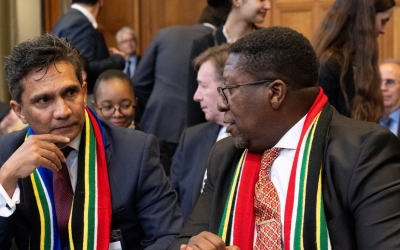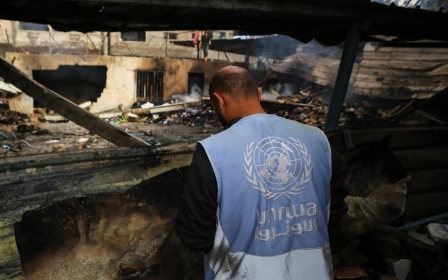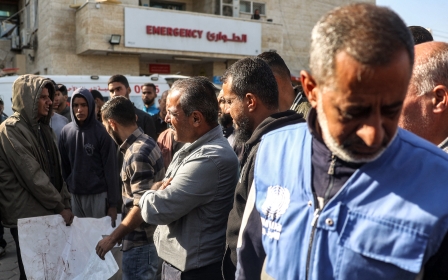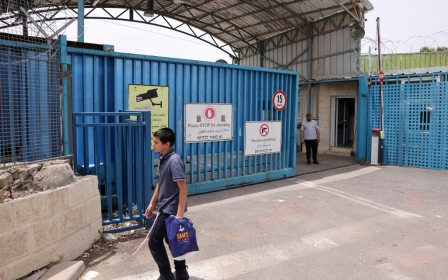Could Israel's Unrwa ban lead to its suspension from the UN?
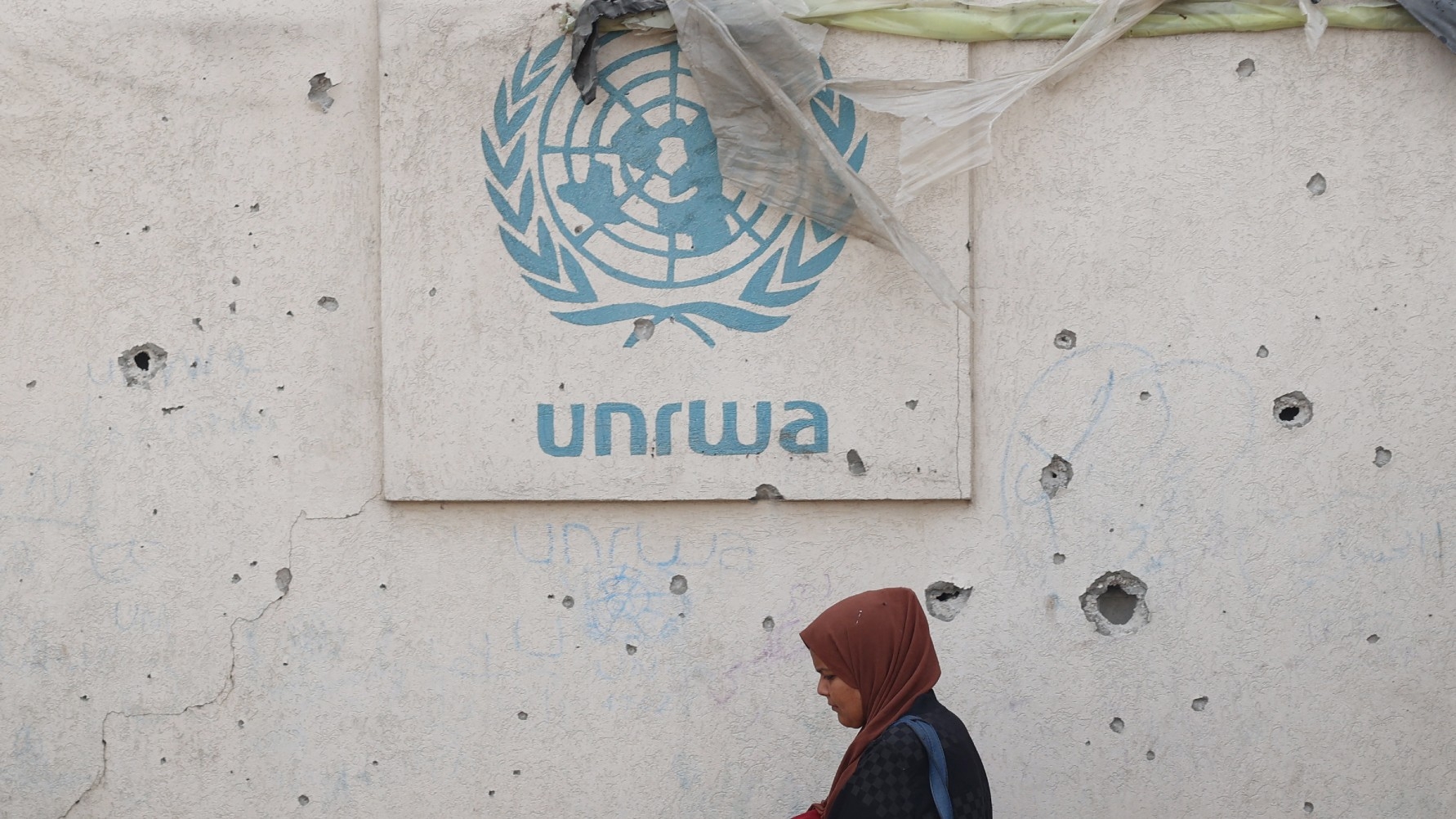
New Israeli laws banning the United Nations agency for Palestinian refugees, Unrwa, have sparked accusations Israel has violated the founding UN charter, raising speculation about whether this may warrant its suspension from the General Assembly, or even expulsion from the UN.
Unrwa is the primary source of humanitarian support for an estimated 5.9m Palestinian refugees in occupied Palestine and neighbouring countries hosting Palestinian refugees.
This includes the provision of basic services like education, food, medical care, and the distribution of fuel. Its closure may inevitably lead to the collapse of the primary lifeline for Palestinians.
What did the Knesset do?
On Monday, Israel's parliament, the Knesset, passed two laws banning Unrwa from operating inside Israel and occupied Palestine. Despite pressure from Israeli allies on MPs not to approve the ban, 92 members of the 120-seat Knesset voted in favour.
New MEE newsletter: Jerusalem Dispatch
Sign up to get the latest insights and analysis on Israel-Palestine, alongside Turkey Unpacked and other MEE newsletters
This came shortly after Israeli authorities confiscated the land in occupied East Jerusalem where Unrwa headquarters is located. Israel plans to build 1,440 settlement units, which are illegal under international law, on the site.
The laws effectively ban Unrwa from operating inside Israel, Gaza, the occupied West Bank and East Jerusalem. The ban would amount to a revocation of privileges and immunities enjoyed by UN organisations under the UN Charter. It is due to come into effect within 90 days of the vote.
The first law says that Unrwa is not allowed to "operate any institution, provide any service, or conduct any activity, whether directly or indirectly", in Israel. The second law prohibits Israeli government officials and agencies from contact with Unrwa.
This will inevitably affect the privileges and immunities to which Unrwa is entitled under international law.
How did the world react to the laws against Unrwa?
The foreign ministers of Canada, Australia, France, Germany, Japan, Republic of Korea and the UK on Monday suggested that the laws may undermine such protected status.
The protection is enshrined in the UN Charter and the General Convention on the Privileges and Immunities of the United Nations.
“The Organisation shall enjoy in the territory of each of its Members such privileges and immunities as are necessary for the fulfillment of its purposes,” the charter states
Eirik Bjorge, professor of law at the University of Bristol, said the new Israeli laws are a clear breach of this part of the UN Charter as well as the convention, which stipulates that United Nations property and assets are inviolable.
According to the convention, "wherever located and by whomsoever held", UN assets and property "shall be immune from search, requisition, confiscation, expropriation and any other form of interference, whether by executive, administrative, judicial or legislative action".
What does international law say?
According to Bjorge, the inviolability of UN premises is absolute under international law. No security or military arguments may justify a breach of that status, he said.
“When the charter provision in question was being drafted, it was stated that if there was one certain principle, it was that no member state could hinder in any way the working of the UN or take any measures the effect of which would be to increase its burdens, financial or other,” Bjorge told Middle East Eye.
“This is exactly what Israel’s legislation seeks to do and does.”
Bjorge said the legislation is “an outrage” against a subsidiary organ of the General Assembly, and that the latter must “do everything within its capacity” to protect Unrwa.
“In the face of such an outrage against it, the UN must lose no time in taking action,” he said.
“It should request the International Court of Justice for an urgent advisory opinion, which under the General Convention on the Privileges and Immunities will be binding on Israel and on the United Nations itself.”
Norway on Tuesday asked the UN General Assembly to request an ICJ advisory opinion on Israel's obligations, as an occupying power, to facilitate humanitarian assistance to Palestinians.
Unrwa has backed Norway's request, according to a statement by the Norwegian foreign ministry.
Is Israel's UN membership at risk?
The Israeli laws also raise questions over whether Israel can be suspended as a UN member state, or a member of the General Assembly.
Under Article 6 of the UN Charter, the General Assembly has the authority to expel a UN member state upon a recommendation from the Security Council, if the state has "persistently violated" the principles enshrined in the charter.
Prior to the vote on Monday, Israeli media reported that foreign ministry officials warned the laws may result in Israel’s suspension from the UN.
No state has ever been expelled from the UN. Such a decision must be subject to a vote by the UN Security Council, which in the case of Israel will likely be vetoed by the United States and other allies.
But there is one historical precedent of suspension from the General Assembly.
On 12 November 1974, the General Assembly voted to suspend South Africa from participation in its work due to international opposition to its apartheid policies.
The vote was passed despite opposition from the US, the UK and other western governments. This, however, did not lead to South Africa’s expulsion as a UN member state.
A resolution recommending South Africa’s expulsion from the UN was vetoed by the Security Council members US, Britain and France on 30 October 1974.
South Africa was readmitted to the UN General Assembly in 1994 after its transition to democracy.
But the South African example was a unique case that may not be simply replicated in the case of Israel's banning of Unrwa, according to Professor Nico Krisch, head of the international law department at the Geneva Graduate Institute.
"South Africa’s suspension from the work of the General Assembly was through a rejection of the credentials of the delegation for not representing the South African people because of apartheid," he told MEE. "The understanding was that the tool could not be used so easily in situations of violations of the Charter unrelated to representation," he added.
"So there are some doubts as to whether it could be used here."
Other scholars, however, have argued that the case of suspending Israel's credentials is stronger than that of apartheid South Africa, given its more than seven decades of defying international legal obligations under the UN Charter, multiple UN Security Council Resolutions, and its disregard for orders by the International Court of Justice.
Has Israel violated an ICJ order?
Israel's government has long been hostile towards Unrwa, partially because it upholds the refugee status of Palestinians who were expelled from their homes in the 1948 Nakba and their descendants.
In late January, Israel accused 12 Unrwa workers of involvement in the 7 October Hamas-led attacks, alleging they had distributed ammunition and aided in civilian kidnappings.
A UN inquiry published in April found no evidence of wrongdoing by Unrwa staff, noting that Israel had neither responded to requests for names and information nor "informed Unrwa of any concrete concerns relating to Unrwa staff since 2011".
Unrwa said on 20 October that Israeli attacks on Gaza since 7 October 2023 have killed 233 of its staff.
It added in its latest situation report that 190 installations, including shelters, schools and medical facilities, have been hit by Israeli forces over the same period, resulting in the deaths of 563 internally displaced people seeking shelter and the wounding of over 1,700.
Against the backdrop of Israeli attacks on Unrwa, South Africa in March submitted an urgent request to the International Court of Justice (ICJ) to issue emergency measures to protect Palestinians from the risk of genocide, as part of its case accusing Israel of violating the Genocide Convention.
The ICJ subsequently issued a legally-binding order for Israel to ensure unhindered provision of humanitarian aid in cooperation with the UN.
Amnesty International’s Secretary General Agnes Callamard described the banning of Unrwa as a breach of the ICJ's order.
“This law flies in the face of the International Court of Justice order to Israel to ensure sufficient humanitarian assistance and facilitate basic services," she said on Tuesday.
What has the UN said about Israel's move?
United Nations Secretary General Antonio Guterres on Monday condemned the Israeli laws as contrary to the UN Charter and international law.
“There is no alternative to Unrwa,” he said.
“If implemented, the laws adopted today by the Knesset of Israel would likely prevent Unrwa from continuing its essential work in the Occupied Palestinian Territory, with devastating consequences for Palestine refugees,” he added.
“I call on Israel to act consistently with its obligations under the Charter of the UN and international law. National legislation cannot alter those obligations.”
Guterres added that he will bring the matter to the attention of the 193-member General Assembly.
Unrwa Commissioner-General Philippe Lazzarini also said the Knesset vote violates the UN Charter and Israel’s obligations under international law.
“These bills increase the suffering of the Palestinians, and are nothing less than collective punishment,” he posted on X.
“It will deprive over 650,000 girls & boys there from education, putting at risk an entire generation of children.”
Lazzarini said that the refugee status of Palestinians will not be impacted by the new laws, a status protected by a General Assembly resolution.
Meanwhile, the UN special rapporteur on occupied Palestine, Francesca Albanese, described the ban as “a fatal and intolerable blow for the UN Charter and the multilateral system.”
“The aim is to accelerate the erasure of Palestinian presence, including through unconscionable humanitarian consequences,” she wrote on X.
Middle East Eye delivers independent and unrivalled coverage and analysis of the Middle East, North Africa and beyond. To learn more about republishing this content and the associated fees, please fill out this form. More about MEE can be found here.



